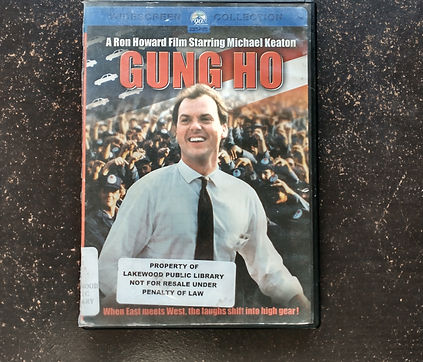
Gung Ho-Ron Howard
The more films I watch with Michael Keaton in the title role the more I come to appreciate his craft. Aside from the obvious greatness that is Batman and Beetlejuice, he has put together a tremendous resume. His versatility is amazing and there is no denying his talent no matter what the role is. Whether it be a comedic brothel managing pimp in Night Shift, a lecherous tenant villain in Pacific Heights, a washed-up actor grasping for straws on Broadway in Birdman, a recovering alcoholic in Clean and Sober (my favorite performance of his), or a fumbling union delegate like in Gung Ho, he is an ace in every single place.
The cast of Gung Ho was pretty top-heavy and—along with Keaton—featured George Wendt, Mimi Rogers, Gedde Watanabe, and John Turturro. Add to this troop a seasoned vet like Director Ron Howard and it would be pretty difficult to fail with the amount of emerging talent at your disposal.
The East meets West culture clashes made for some pretty good comedy en route to eventually creating an inevitable quagmire. Unlike the usual predecessors of the 80s (I made mention of in my book) that disregarded Asian actors as Bonzai screaming goofballs, I felt that the writers painted the Japanese conglomerates of Assan in a fairly respectable light.
It was pretty funny to see them remove their shoes when the townsfolk rolled out the red carpet at the airport. And the plant managers taking a communal diaper dip in the Ohio River is something that would make me turn my head if I ever saw it while driving down the street.
But in Gung Ho it wasn't done with malicious intent. To caricature the Japanese and their customs as being beneath the Americans. It felt as if it were written only to laugh at the struggle to adapt. Which Keatons character, Hunt Stephens, contrarily does in the beginning during his voyage over to Japan.
Overall it was an amusing take on a time when struggles within the auto industry were very real and worked to bellow a fresh breath of levity-laden air into a tumultuous obstacle within America's struggling economy.
The town needed jobs, but also a reality check at the time of being outmatched by the competition. This is a sobering fact that a lot of Americans fail to realize, that, with the automatic blessings of running water, steady work, a roof over our heads, clothes on our backs, and the basic guarantee of food to get into our belly three times a day, we have grown to become lazy and complacent. Unlike other countries that have had to endure constant rebuilds from various wars, America has always been on the industrial upswing. The assumption of ever-flowing creature comforts induces laziness and expectancy, and, during which time we have succumbed to these social ills, the countries we once liberated from oppression have reemerged with a work ethic born out of resiliency and surpassed us. I saw it constantly in my thirteen years in the casino industry and know that it is not restricted to this vocational realm.
Anthony Bourdain touched on this in Kitchen Confidential, and, this quote, while referencing Hispanics, I believe is appropriate for the tone of this movie.
"Despite our ridiculously hypocritical attitudes towards immigration, we demand that Mexicans cook a large percentage of the food we eat, grow the ingredients we need to make that food, clean our houses, mow our lawns, wash our dishes, look after our children. As any chef will tell you, our entire service economy — the restaurant business as we know it — in most American cities, would collapse overnight without Mexican workers. Some, of course, like to claim that Mexicans are ‘stealing American jobs.’ But in two decades as a chef and employer, I never had ONE American kid walk in my door and apply for a dishwashing job, a porter’s position — or even a job as a prep cook. Mexicans do much of the work in this country that Americans, probably, simply won’t do."
In Gung Ho, it isn't that Americans are unwilling to do the work, it's the stone-cold fact that they have fallen behind in the line. Japanese and foreign automakers treat vocations with the same amount of respect as one would their religion, while we as Americans clock in with petulant attitudes and exploit any window available to lighten the slack of the workload.
Now, this doesn't mean that work has to consume your life either, as Oisho Kozihiro comes to eventually realize in Gung Ho. Families, love, and relationships are the true gems deserving of our attention in this life, not black-and-white numbers. Somewhere in between there is a balance to be found.
I enjoyed this film pretty well, and the humor was decent enough. But even with the star-studded cast, at the end, it was a subdued and pedestrian comedy that succeeded in getting a few mild chuckles out of me.
Rather Ho Hum though overall.
Stars: **1/2
Verdict: Pass
Cousins: Tommy Boy, Blue Collar, The Deer Hunter, Glengarry Glenross, Slap Shot